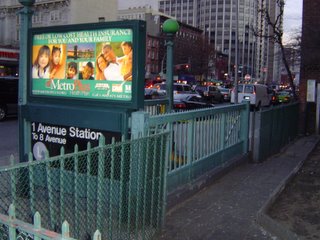Update on the stupid science test score situation. As M. Gatton pointed out in the comments, 8th graders leave their middle schools and are dispersed all over the city for high school. Since they are no longer registered in their middle schools by the time the tests are scored, it is difficult (M. claims
impossible) to get one's scores as a middle school teacher. I had a sneaking feeling that might be a problem but didn't bring it up yesterday because I assumed that the competent people at the Department of Accountability and Assessment (or vice versa) would have TOLD ME THAT in their response to my request for my scores. Since they did not, and since they informed me that the individual scores and aggregate data for schools were available on ATS, I thought - delusionally - that the scores would actually
be available on ATS. They were not, or, if they were, they were hidden in such a clever fashion that my AP and school aide were unable to find them. Either way, so much for the ACCOUNTABILITY part of the DAA, though they seem to have ASSESSMENT nailed. How the hell do you design a system so that teachers can't get their former students' test scores, when the tests were designed primarily for program evaluation purposes??? Or, if they are available, how the hell do you design a system so difficult to navigate that experienced administrators can't find a simple piece of information???
Some of you are wondering why I'm so obsessed with these scores.
For one thing, if they'd been handed to me in a timely and sensible manner, no obsession would be necessary, and I really do believe that if we are going to give a test, we deserve to know how our students - and, by extension, our teaching - performed. (It would be even nicer if the kids stood a chance of ever knowing how they did, but that's a pipe dream).
But more importantly, it's what the scores have come to symbolize, which is my increasing frustration with the fact that as a science teacher, I feel invisible in this system.* I am only in my sixth year of teaching. I have a LOT to learn. Yet, I have NO MENTOR or experienced science teacher to ask questions of or to observe or to be observed by. I would give my left arm to attend a series of PD sessions on best practices in Science Education instead of endless repetitive sessions on ELA and Math (and I say that knowing full well that PD in my school is pretty
good; god help the science teachers in places where it isn't!). I value those things. But people, six years of PD on how to teach someone else's subject??? Hell, I would lead science PD workshops if someone asked me to.
I spend my weekends and evenings planning lessons that integrate reading, writing, mathematics, that are scientifically rigorous, that teach practical skills and lead to understanding of concepts. No one has ever, EVER made more than a nominal effort to integrate science into their curriculum, to read science books for a unit on nonfiction, to take two minutes to find out what I'm teaching and offer to make up math problems that involve the science concepts. It wouldn't be hard. I would help. I've offered to help.
I lose teaching periods to administer tests in other subject areas. I lose teaching periods to grade tests in other subject areas. Nevertheless, I am expected to prepare my students for an exam in the eighth grade. I buy in. I respect the test, and the knowledge and skills it demands of students. I prepare them. AND I WILL APPARENTLY NEVER KNOW HOW THEY/WE DID. Well, fnck you, too. And no, I never said I wouldn't curse on this blog. If you've been reading it aloud to your 6-year-old, you'll probably want to stop.
Oh, and then there's the hiring issue. In eight months of (more or less active) looking, we can't find a single good candidate. We interview people who have no teaching skills but know some science, and some who might be able to teach but don't know any science. We interview people who have both but - oops! - don't really want to work in the South Bronx. So we cut science classes. We overextend ourselves so that we don't have to cut more. We double and triple our commitment to excellence despite the odds. And you know what? I really don't think anyone gives a sh!t. It's just science, after all. It's just the background knowledge to make considered judgments about our environment, about the value of space exploration, about one's own health. It's just the skills one needs to go on to lucrative and respectable careers as doctors, engineers, architects, nurses, computer programmers, astronomers, and researchers in all fields. It's a topic that interests many kids who aren't that into other subjects, something they might be willing to write about once they've had a hands-on experience, something they might be willing to learn a little math in order to understand better. Or at least something that might keep one or two of them coming back to school. But really, I should be grateful. In most (I daresay) elementary schools and many middle schools, four periods of science a week is unheard of.
And then there's the Science Expo. I like the Science Expo. The kids like the Science Expo - or at least, they ask if we're doing it again this year. But I told my principal today that it's going to be a bloody miracle if we have one at all this year, given that there are only two of us and over 100 pairs of kids who each will have to do a project. And given that we have less time with the students than usual. We will do one, oh yes we will, and we will scale it back in certain ways, limit the kids' choices to make it more manageable, but we will try very hard to preserve that element of choice that gives ownership to the kids. We'll do it because it's important, but that doesn't mean we'll enjoy it.
And in only a few months, it will be time to give the ILS exam again. I can't hide my enthusiasm. I was hoping to get a chance to spend hours setting up and calibrating instruments, administering the test, and then scoring it. Thanks. It was so nice of you, Dept. of ACCOUNTABILITY and Assessment, to think of little ol' me, and design a test just for my subject area.
*Don't get me wrong, I wouldn't want the pendulum to swing to the other extreme, the intense pressure and micromanaging and over-testing that plagues English and Math instruction in this city. I don't want tests every year or mandatory practice tests or to force any music teachers to sit through hours of science PD or a lockstep curriculum or any of that BS. But a happy medium - surely that's possible? A sense that if I do what I do well, someone will notice and care? A sense that other people will do their very best at the parts of their jobs that support what I do?
*****
Exactly how many days in a row of being irritable and emotional and lonely does one have to experience before worrying that one is a head-case? Call it burn-out, call it a bad case of winter, call it two months of PMS, call it just a normal reaction to very real stresses and stressful events?* And yes, I DO take care of myself. I take evenings off from schoolwork, perhaps too often. I sleep in on weekends, I go out, I stay in, I eat well, I eat chocolate, I exercise, I'm hydrated. I don't want a new job, I want to like THIS job more. Or maybe I just want this job to like ME more. Sometimes it's NOT "taking time for myself" that makes me feel better, it's taking time to push back the chaos just
that much, like cleaning my desk today and organizing the to-be-graded tasks into neat, manageable piles and finishing one-point-five of those projects.
*Some would call it being immature and unprofessional and obsessive (and have, in the comments, in the past, when I've written posts like this... please don't, it's patronizing).
















































